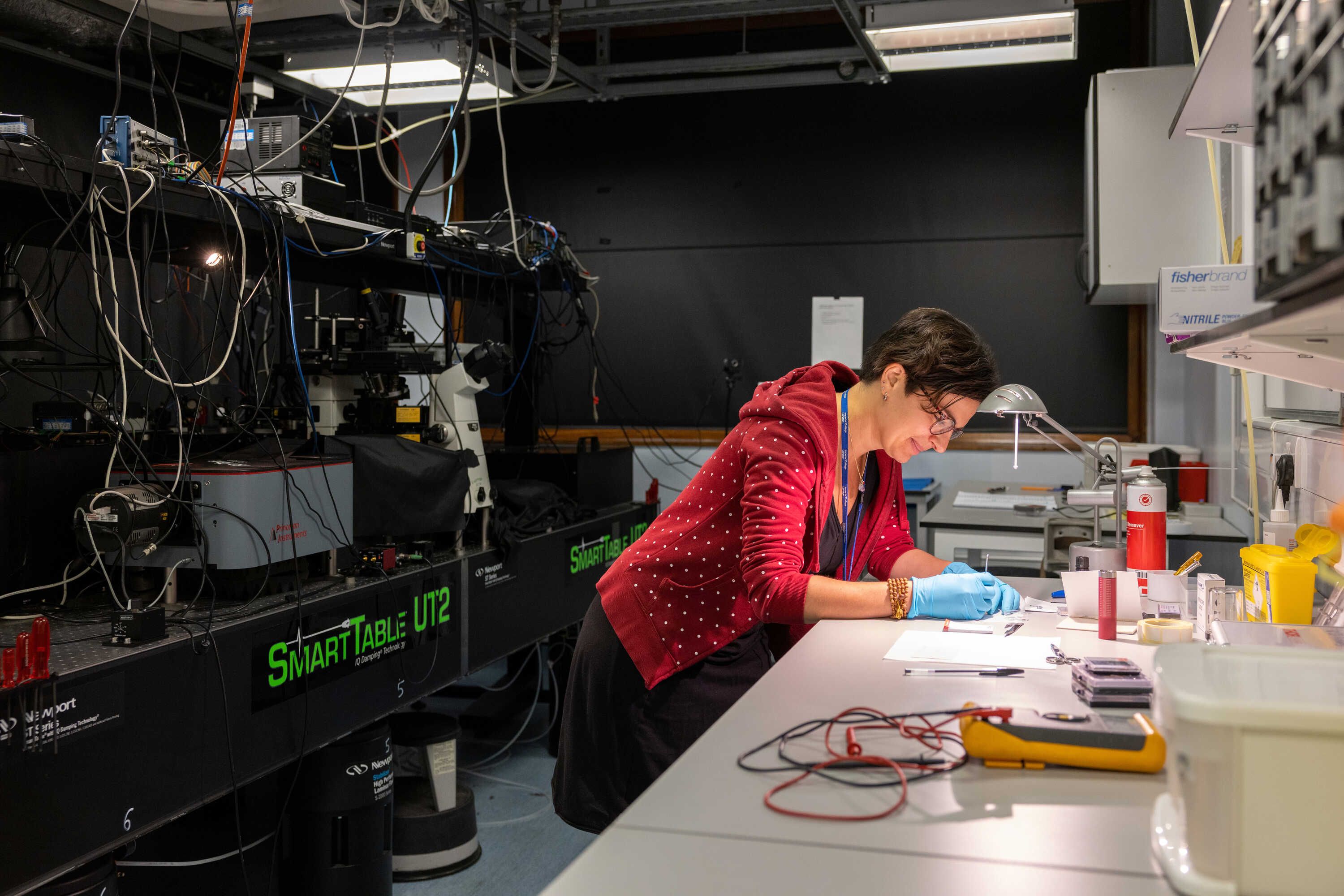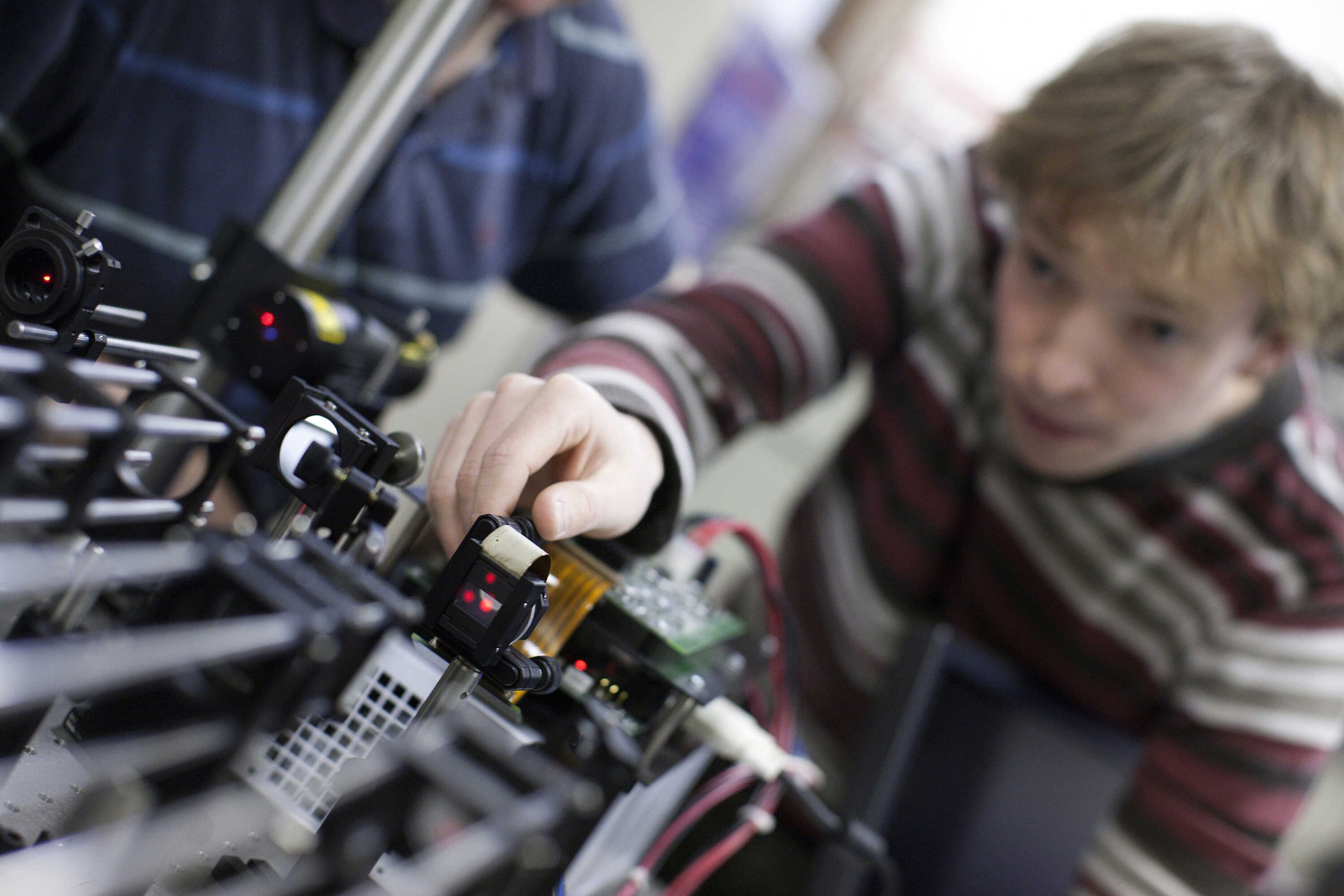
Optics and Photonics
Discover why optics is of key importance to many industrial sectors on one of the College’s longest-established courses.
Discover why optics is of key importance to many industrial sectors
Carry out substantial laboratory and project work in one of the UK’s largest centres for optics research and application
Study on one of the College’s longest-established courses
Course key facts
-
Qualification
-
MSc
-
-
Duration
1 year, 2 years
-
Start date
September 2025
-
Study mode
Full-time, Part-time
-
Fees
£16,000 Home
£38,300 Overseas
-
Delivered by
-
Location
-
South Kensington
-
Minimum entry standard
-
2:1 in physics, mathematics or electrical engineering
Course overview
Advance your knowledge of optics in one of the largest centres for optics-based research and application in the UK. Discover why this field is of key importance to many industrial sectors including medicine, ICT and high-tech manufacturing.
Imperial has offered an advanced course in optics for over 80 years. The current MSc in Optics and Photonics draws on that wealth of experience to prepare graduates for employment within a variety of careers in industry or further doctoral studies.
The programme will explore key topics including imaging, laser fundamentals, optical measurements and devices, and optical communications.
You'll carry out substantial laboratory and project work during the course. There is also a chance to undertake a self-study project in an area of your choice. Your studies will conclude with a full-time project, which may be in industry, an academic research group, or abroad.
Structure
This page is updated regularly to reflect the latest version of the curriculum. However, this information is subject to change.
Find out more about potential course changes.
Please note: it may not always be possible to take specific combinations of modules due to timetabling conflicts. For confirmation, please check with the relevant department.
You’ll take all of these core modules, and complete a full-time project looking into a specialist area of optics research.
Core modules
Explore themes including Fermat's Principle, Snell's law, stops and pupils, complex amplitude and the resolution of imaging systems.
Gain an understanding of the fundamentals of laser physics.
Explore common optical measurement and devices, learn about polarisation, and discover practical techniques for the manufacture of thin film devices.
Carry out a self-study project in an area of your choice.
You’ll also choose optional modules to a total of 25 to 27.5 ECTS.
Optional modules
Understand the operation principles and technology of optical fibre networks and analyse the key physical concepts underlying laser and nonlinear optics.
Explore elements of optimal design including finite ray tracing, chromatic aberrations, and the use of aspheric surfaces in imaging systems.
Become familiar with the principles and practice of laser devices and nonlinear optical technology.
Analyse the principles and practice of biomedical imaging technologies, including microscopes, fluorescence and tomography.
Examine the most important device components from the worlds of optical telecommunication, space lighting, optical displays and sustainable energy production.
Discover how fibre and ultrafast lasers work and gain insight into why they are such useful tools in a wide variety of scientific and industrial applications.
Showcase your knowledge and skills acquired across the course on a four-month, full-time project.
This can be carried out in industry, abroad, or in conjunction with an academic research group.
Teaching and assessment
Balance of teaching and learning
Key
- Lectures and classes
- Laboratory work
- Project work
- 44% Lectures and classes
- 17% Laboratory work
- 39% Project work
Teaching and learning methods
-
Virtual learning environment
-
Individual project
-
Lectures
-
Lecture recordings
-
Practical work
-
Problem classes
Balance of assessment
Key
- Written examinations
- Laboratory work
- Project work
- 44% Written examinations
- 17% Laboratory work
- 39% Project work
Assessment methods
-
Coursework
-
Examinations
-
Oral presentation
-
Poster
-
Practical
-
Reports
-
Oral assessment
Entry requirements
We consider all applicants on an individual basis, welcoming students from all over the world.
How to apply
Apply online
You can submit one application form per year of entry. You can choose up to two courses.
Application deadlines – Round 1 closes on Thursday 16 January 2025
We operate a staged admissions process with several application rounds throughout the year.
Apply by 23.59 (UK time) on the closing date of an application round, to ensure you receive a response on your application by the relevant decision date.
Application rounds
Round 1
- Applications open on Friday 27 September 2024
- Applications close on Thursday 16 January 2025
- Decision by Thursday 6 March 2025
Round 2
- Applications open on Friday 17 January 2025
- Applications close on Thursday 27 March 2025
- Decision by Thursday 1 May 2025
Round 3
- Applications open on Friday 28 March 2025
- Applications close on Thursday 15 May 2025
- Decision by Thursday 17 July 2025
Round 4
- Applications open on Friday 16 May 2025
- Applications close on Friday 4 July 2025
- Decision by Thursday 31 July 2025
There is no application fee for MRes courses, Postgraduate Certificates, Postgraduate Diplomas, or courses such as PhDs and EngDs.
If you are applying for a taught Master’s course, you will need to pay an application fee before submitting your application.
The fee applies per application and not per course.
- £80 for all taught Master's applications, excluding those to the Imperial College Business School.
- £100 for all MSc applications to the Imperial College Business School.
- £150 for all MBA applications to the Imperial College Business School.
If you are facing financial hardship and are unable to pay the application fee, we encourage you to apply for our application fee waiver.
Find out more about how to apply for a Master's course, including references and personal statements.
Unless you are from an exempt nationality, you will need an ATAS certificate to obtain your visa and study this course.
Nationals from the following countries are exempt: Switzerland, Australia, Canada, Japan, New Zealand, Singapore, South Korea, USA and EEA members.
Use this information when applying for an ATAS certificate to study this course:
- CAH code: CAH07-01-01
- Descriptor: Physics
- Supervisor name: Professor Michele Dougherty
Get guidance and support for obtaining an ATAS certificate.
Tuition fees
Home fee
Full-time
£16,000
Part-time
£8,000per year
You should expect and budget for your fees to increase each year.
Your fee is based on the year you enter the university, not your year of study. This means that if you repeat a year or resume your studies after an interruption, your fees will only increase by the amount linked to inflation.
Find out more about our tuition fees payment terms, including how inflationary increases are applied to your tuition fees in subsequent years of study.
Whether you pay the Home or Overseas fee depends on your fee status. This is assessed based on UK Government legislation and includes things like where you live and your nationality or residency status. Find out how we assess your fee status.
If you're a UK national, or EU national with settled or pre-settled status under the EU Settlement Scheme, you may be able to apply for a Postgraduate Master’s Loan from the UK government, if you meet certain criteria.
For courses starting on or after 1 August 2024, the maximum amount is £12,471.
The loan is not means-tested and you can choose whether to put it towards your tuition fees or living costs.
Overseas fee
Full-time
£38,300
Part-time
£19,150per year
You should expect and budget for your fees to increase each year.
Your fee is based on the year you enter the university, not your year of study. This means that if you repeat a year or resume your studies after an interruption, your fees will only increase by the amount linked to inflation.
Find out more about our tuition fees payment terms, including how inflationary increases are applied to your tuition fees in subsequent years of study.
Whether you pay the Home or Overseas fee depends on your fee status. This is assessed based on UK Government legislation and includes things like where you live and your nationality or residency status. Find out how we assess your fee status.
If you're a UK national, or EU national with settled or pre-settled status under the EU Settlement Scheme, you may be able to apply for a Postgraduate Master’s Loan from the UK government, if you meet certain criteria.
For courses starting on or after 1 August 2024, the maximum amount is £12,471.
The loan is not means-tested and you can choose whether to put it towards your tuition fees or living costs.
How will studying at Imperial help my career?
Learn how to apply your knowledge of optics and photonics to a wide range of industrial and research contexts.
Our graduates often pursue further study in master's programs or doctoral research.
Alumni are highly sought after for a variety of careers in industry.
Further links
Contact the department
- Telephone: +44 (0)20 7594 7512
- Email: optandphotmsc@imperial.ac.uk
Course Directors: Prof. Chris Dunsby, Dr. Mary Matthews, Dr. James McGinty and Prof. Mark Neil.
Visit the Department of Physics website.

Request info
Find out more about studying at Imperial. Receive updates about life in our community, including event invites and download our latest Study guide.

Events, tasters and talks
Meet us and find out more about studying at Imperial.

Terms and conditions
There are some important pieces of information you should be aware of when applying to Imperial. These include key information about your tuition fees, funding, visas, accommodation and more.
You can find further information about your course, including degree classifications, regulations, progression and awards in the programme specification for your course.
Programme specifications